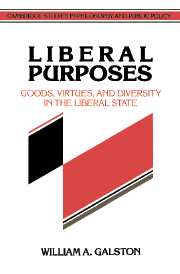Book contents
- Frontmatter
- Contents
- Acknowledgments
- PART I LIBERALISM AND POLITICAL PHILOSOPHY
- 1 Introduction
- 2 Peirce's cable and Plato's cave: objectivity and community in contemporary political philosophy
- 3 Contemporary critics of liberalism
- PART II LIBERALISM AND NEUTRALITY
- PART III LIBERALISM WITHOUT NEUTRALITY
- PART IV FROM THEORY TO PRACTICE IN THE LIBERAL STATE
- Notes
- Index
2 - Peirce's cable and Plato's cave: objectivity and community in contemporary political philosophy
Published online by Cambridge University Press: 05 June 2012
- Frontmatter
- Contents
- Acknowledgments
- PART I LIBERALISM AND POLITICAL PHILOSOPHY
- 1 Introduction
- 2 Peirce's cable and Plato's cave: objectivity and community in contemporary political philosophy
- 3 Contemporary critics of liberalism
- PART II LIBERALISM AND NEUTRALITY
- PART III LIBERALISM WITHOUT NEUTRALITY
- PART IV FROM THEORY TO PRACTICE IN THE LIBERAL STATE
- Notes
- Index
Summary
The title of Richard Bernstein's book Beyond Objectivism and Relativism neatly sums up a central strand of discussion within contemporary political and moral theory. The guiding idea is this: The kinds of objectivity claims characteristic of the philosophic tradition from (say) Plato to Kant cannot be redeemed, but what is widely taken to be a consequence of this – the relativization of truth claims, both scientific and normative – is unacceptable. There is therefore a felt need for some via media or, alternatively, for a redefinition of the alternatives that removes the distress that is frequently felt at the prospect of being compelled to choose between them.
A typical response to this need has been to situate individual propositions and judgments within discursive communities. Assessments of rationality, truth, and validity can be made relative to the constitutive commitments of particular communities. There is, however, no neutral external standpoint from which such assessments can be made across the boundaries of such communities. Thus, Richard Rorty asserts, “There will be no way to rise above the language, culture, institutions and practices one has adopted and view all these as on a par with all the others.” To accept this claim “is to give up on the idea that there can be reasons for using languages as well as reasons within languages for believing statements.” Alasdair MacIntyre has recently defended a similar position. As Charles Larmore summarizes it:
MacIntyre's principal claim is that rationality – in ethics as elsewhere – is possible only within a tradition.
- Type
- Chapter
- Information
- Liberal PurposesGoods, Virtues, and Diversity in the Liberal State, pp. 22 - 41Publisher: Cambridge University PressPrint publication year: 1991

